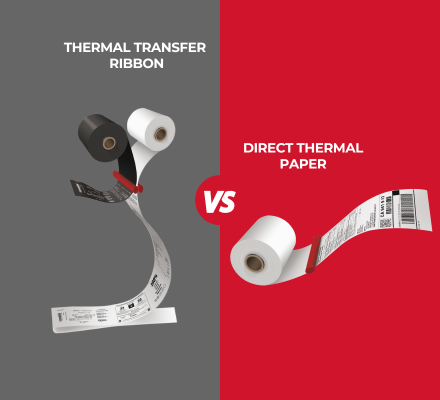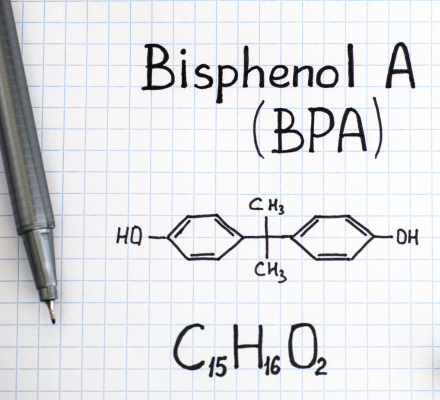According to a report from the World Health Organization, an intake of just 23mg/kg(1) of body weight can be life-threatening to humans. Furthermore, improper disposal of phenol waste can leave long-lasting consequences for the environment.
Since phenol is also an essential component in the production of thermal transfer printing materials like ribbons and labels, in this article, Ricoh will explore phenol with you and why using phenol-free products is becoming the new trend. Let's dive into this topic together.
 What is Phenol? Things to know about Phenol
What is Phenol? Things to know about PhenolWhat is Phenol? Applications of Phenol in Label Manufacturing
Phenol is an aromatic organic compound with the chemical formula C6H5OH, first discovered by extraction from coal tar. It is used in the packaging industry and is an essential component in the thermal coating of labels. Here are the roles of phenol:
- Used as a protective surface coating for labels
- Form the color or ribbons on labels
- Constitutes the binding compound in paper and synthetic plastics for label
 The Application of Phenol. Why is Phenol popular?
The Application of Phenol. Why is Phenol popular?Phenol plays such an important role in label manufacturing technology for the following reasons:
- Filler: To create the necessary thermal transfer effect, when the thermal print head heats the phenol-containing ink, the phenol vaporizes and diffuses into the thermal coating of the paper/label, forming the printed image.
- Increases roughness and adhesion: Phenol is mixed into the ink to increase roughness and ribbon adhesion to the label decal or paper surface for sharper print quality.
- Plasticizer: In plastic-based inks, phenol acts as a plasticizer to increase the flexibility and stretchability of the ribbons during printing, preventing cracking and prolonging label life.
- Colorfastness and abrasion resistance: Phenol is also used to improve ink color retention and abrasion resistance when printing on complex surfaces like synthetic plastics.
- Low cost: Relatively inexpensive, suitable for use as an additive in label and thermal ribbons production.
 What role does Phenol play in label production?
What role does Phenol play in label production?| Compounds | Applications |
| Phenol-formaldehyde Plastic (Bakelite) | Coating the label surface helps make the label rugged, abrasion-resistant, and waterproof. |
| Phenol-resin binding agent | It helps bond layers of paper and cardboard to form labels. |
| Bisphenol A (BPA) | As a coating or forming label material. Read more about BPA. |
| Alkylphenol ethoxylates (APEs) | Emulsifiers, thickeners, and detergents in the production of printing ribbons and coatings for labels |
| Trishydroxyphenylpropan (THPP) | Producing high heat-resistant phenol-formaldehyde resin as a fireproof material layer for labels |
| Bisphenol S (BPS) | The compound used to replace Bisphenol A as a surface coating, Increases viscosity and adhesion for inkjet and offset inks |
How Does Phenol Affect Health & Environment?
According to the World Health Organization (WHO), phenol can cause symptoms such as:
- Skin effects: Phenol can cause skin irritation. Exposure can cause discoloration, dermatitis, and swelling.
- Respiratory effects: Inhaling phenol can cause throat and lung mucous membrane inflammation.
- Digestive effects: Ingesting phenol can cause abdominal pain, nausea, and vomiting.
- Neurological effects: Phenol can affect the nervous system, causing blurred vision, ringing ears, and nosebleeds.
- Cardiovascular effects: Phenol can affect the cardiovascular system, causing increased heart rate and blood pressure.
In addition to human health impacts, phenol also causes severe environmental pollution. Industrial wastewater containing phenol can contaminate groundwater and aquatic ecosystems. The presence of phenol in the air also contributes to acid rain, smog, and nitrogen imbalance in soil.
Researchers at Boston University Medical School have also recently linked long-term phenol exposure to increased cancer risk, thyroid dysfunction, and even congenital disabilities.
Regulations on Phenol in Vietnam and Key Export Markets
| Nation | Industry | Regulations | Limits |
| Vietnam | Water | QCVN 01:2009/BYT | 0,001mg/l |
| Industrial wastewater | QCVN 40:2011/BTNMT | 0,5mg/l | |
| Children toys | QCVN 16:2020/BCT | 30mg/kg | |
| Packaging materials in direct contact with food | QCVN 12-1:2011/BYT | 0,05mg/kg | |
| USA | Water | EPA | ,001mg/l |
| Packaging materials in direct contact with food | FDA | 0.05mg/kg | |
| Europe | Packaging materials in direct contact with food | EU No. 10/2011 | 0,05mg/kg |
| Japan | Water | MHLW | 0,005mg/l |
| China | Water | GB5749 | 0,002mg/l |
| Packaging materials in direct contact with food | GB9685 | 0,05mg/kg | |
| ASEAN | Packaging materials in direct contact with food | Annex 2/3/ASEANPFCMR ACCSQ | 0,05mg/kg |
Vietnam and the most significant export markets, such as the US, Europe, China, and ASEAN, have clear regulations, especially regarding the phenol migration limit in food contact materials at 0.05mg/kg.
Disposing of Phenol-Containing Waste
- Highly toxic: Hazardous to personnel health if not handled properly.
- Difficult to degrade: Phenol is a persistent organic compound that is difficult to degrade via normal biological processes fully. It can persist long-term in the environment.
- High leakage risk: Being water-soluble, phenol leakage can severely pollute groundwater and soil.
- Requires special treatment: High-temperature incineration, oxidation, and hazardous landfilling require advanced tech, dedicated infrastructure, and high costs.
- Specialized workforce: Hazardous waste treatment needs highly trained personnel in occupational safety and treatment techniques.
For these reasons, transitioning to low-phenol or phenol-free packaging and labeling materials will be inevitable in the coming years.
So what is Phenol Free? And what packaging & labeling solutions should businesses adopt to meet export standards for promising markets?
What is Phenol Free?
The "Phenol Free" standard refers to products that contain no or extremely low trace amounts of phenol, usually below regulated thresholds.
The Phenol Free standard is typically applied to:
- Packaging materials in direct food/beverage contact
- Household items like kitchenware, toys
- Cosmetics, personal care products
- Household cleaning products
- Interior paints and varnishes
In packaging and labeling, Phenol Free indicates products free of phenol-based compounds like BPA, BPS, etc.
 Trend of using Phenol-Free products
Trend of using Phenol-Free productsWhy Should Businesses Choose Phenol-Free Packaging & Labeling?
- First, it meets the regulations of export markets, as mentioned earlier
- A Phenol Free production process enhances product competitiveness, as consumers now prefer safe, eco-friendly products
- It ensures user health and contributes to a sustainable environment
- Lastly, after lessons from past cases of rejected/canceled shipments, adopting Phenol Free helps mitigate complaints over exceeding permitted phenol limits in demanding markets
Here's a translation of the additional information about why Ricoh's labels meet the Phenol Free standard
Why are Labels Developed by Ricoh Suitable for the Phenol Free Standard?
At Ricoh, we are committed to ensuring all our products have their hazardous chemical content controlled according to international standards. To move towards a sustainable society and circular economy by replacing phenolic compounds containing colorants in the thermal layer with safer alternative materials, Ricoh has created products that meet the phenol-free standard.
Benefits of using Ricoh's labeling solutions:
- Meet market regulations with certifications: Phenol Free, BPA Free, MSDS, REACH, Halogen-Free, FSC, etc.
- Safe for health and environmentally friendly
- Temperature resistance from -40°C to 90°C
- Image preservation from 5 - 22 years
- Customizable sizes and quick delivery thanks to a factory in Vietnam
Phenol Free Labeling Solutions from Ricoh
As mentioned in the article about BPA, Ricoh understands businesses' needs in pursuing solutions to increase product competitiveness. Some Phenol Free certified products:
| Applications | Product item | Features |
| Carton labels Food labels Ingredients labels | 135LA-1 W2-ST2 |
|
| Labels for medical use Food labels Cold storage label | 150LA-1 W2-CL2 |
|
| Logistics labels Process label Food labels | 150LA-1 W2-RE S (contact) |
|
| Carton label Food labels Ingredients labels | (contact) |
|
Conclusion
In the globalization and green transition trend, regulations and standards restricting phenol use will only become stricter. As such, Phenol Free materials like Ricoh's labels will meet the most stringent standards and become the superior solution for businesses in their packaging and labeling processes.
With top quality, reasonable pricing, and a commitment to supporting businesses' specific needs, Ricoh confidently aims to be a reliable partner. Contact Ricoh IMS Vietnam for consultation and prompt support via [email protected] and hotline: tel:+84 28 3528 5252.
Ready to use Phenol-Free labels?
Get in touch with one of our consultants and find out our Direct Thermal Phenol-Free labels
Let's Connect
Let’s connect
Get in touch with one of our consultants and find out how we can help you to implement a barcode system
Recommended resources for you
.png)
Things You Should Know About Warehouse Management in 2024
Discover the top trend of warehouse management in 2024

Direct Thermal or Thermal Transfer: Which One To Choose?
This article will provide step-by-step guidance to help you navigate the world of thermal printing technology.



